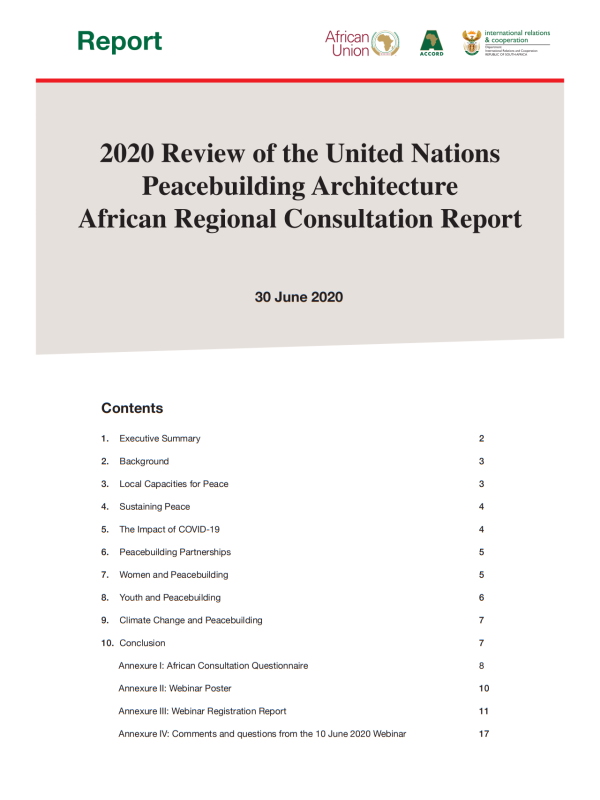
- Report
2020 Review of the United Nations Peacebuilding Architecture African Regional Consultation Report
The 2020 United Nations (UN) peacebuilding review takes stock of the progress made over the first 15 years of the UN’s Peacebuilding Architecture (PBA).
The 2020 United Nations (UN) peacebuilding review takes stock of the progress made over the first 15 years of the UN’s Peacebuilding Architecture (PBA). ACCORD consulted a number of stakeholders in Africa on their experiences to date with the PBA between March and May 2020, culminating in a virtual webinar consultation that took place on 10 June 2020 in partnership with the South African Department of International Relations and Cooperation (DIRCO) and the African Union (AU) Commission.
The 2020 UN peacebuilding review has a special interest on the impact of peacebuilding efforts at the field level. In this regard, ACCORD decided that the theme for its African Regional Consultation will be “Sustaining Peace in Africa: Local Capacities for Peace”. Inputs received for the African Consultation show that despite policy commitments to local ownership and investments in local and national capacities for peace, the funding, coordination, planning, and the state-centric decision-making structures still favour UN agencies, international Non-Governmental Organisations (NGOs), and national authorities. Local peacebuilders are not sufficiently involved in the identification of needs, the framing of the issues or the design of the programmes and results frameworks.
The majority of those who were consulted for this report had little knowledge of the Sustaining Peace concept. Those who are more familiar with the concept feel that the degree to which it emphasizes local and national ownership, early preventative action, and system-wide cooperation, collaboration, and coherence is exemplary. However, they felt its implementation strategies or mechanisms were weak.
Even before COVID-19, there was concern about the degree to which the international, regional, and national systems valued and mobilized funding towards sustaining peace. Now, with an emerging global recession in the wake of COVID-19, the challenge for peacebuilding financing is even more accentuated. Almost all peacebuilding initiatives and programmes have been affected by COVID-19, and especially the measures introduced to prevent the spread of the disease. Many activities necessary to prevent, manage, and redress tensions and violent conflicts have been disrupted.
The AU and UN’s exemplary work to operationalize their strategic partnership at the political and Commission-Secretariat levels now needs to move to a more meaningful partnership in the field where AU, UN, and other partners are still operating largely in silos alongside each other. COVID-19, climate change and other such system-wide social-ecological stressors should motivate these partners to work closer together, including with national and local peacebuilders, to maximize their collective capabilities and resources, and to focus their efforts where most needed.
Women continue to be disproportionately affected by structural and material barriers that limit their participation in peacebuilding activities. For the UN Peacebuilding Architecture to strengthen its relevance to women, it has to move away from the state-centric, blueprint-focused, and technically oriented approaches. A field- and people-oriented approach is needed, rooted in the local context with strengthened local and national capacities for peace. It is time to shift from demonstrating inclusion to assessing the quality of the involvement of women and youth, assessed against the agency they have to influence the purpose and content of the peacebuilding programmes that they are meant to benefit from.
Young people are affected by conflict, yet they are excluded from peace and decision-making processes. Generally, programmes are designed by practitioners or experts who are far removed from the lived realities of young people. Local youth-led organisations and networks have a nuanced understanding of the local context and know how to navigate the environments in which they operate. However, they face various barriers in accessing funding as few donors fund youth-led initiatives directly.
Since the previous UN peacebuilding review in 2015, the impact of climate change on people’s lives has become noticeable. Investing in local and national capacities for peace is critical, as local and national resilience, adaptive capacity, social capital, and social cohesion are critical for communities and societies to withstand shocks and climate-related stress. Thus, peacebuilding has to develop better ways in which international, regional, national, and local peacebuilders can support and strengthen local and national capacities for peace, taking into account climate-related peace and security risks.
